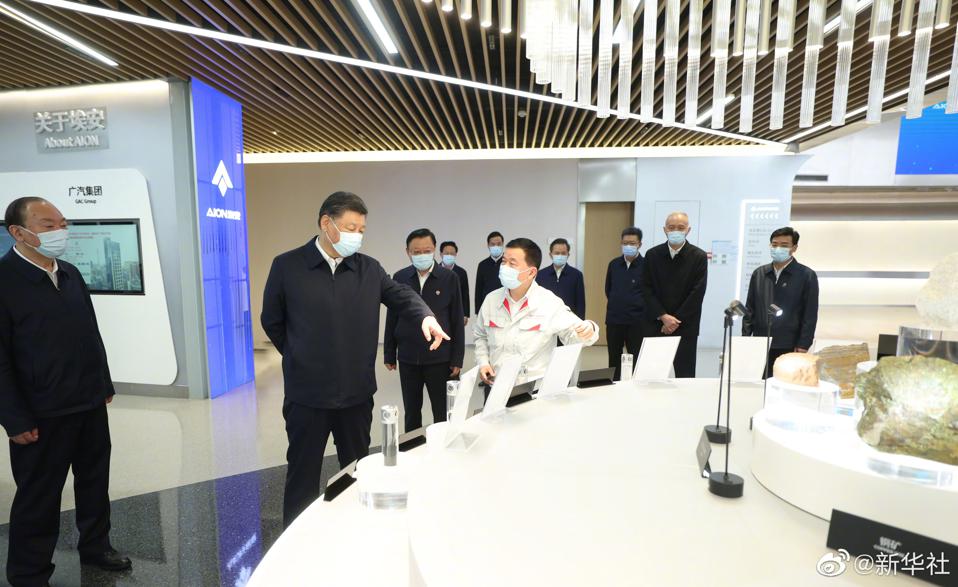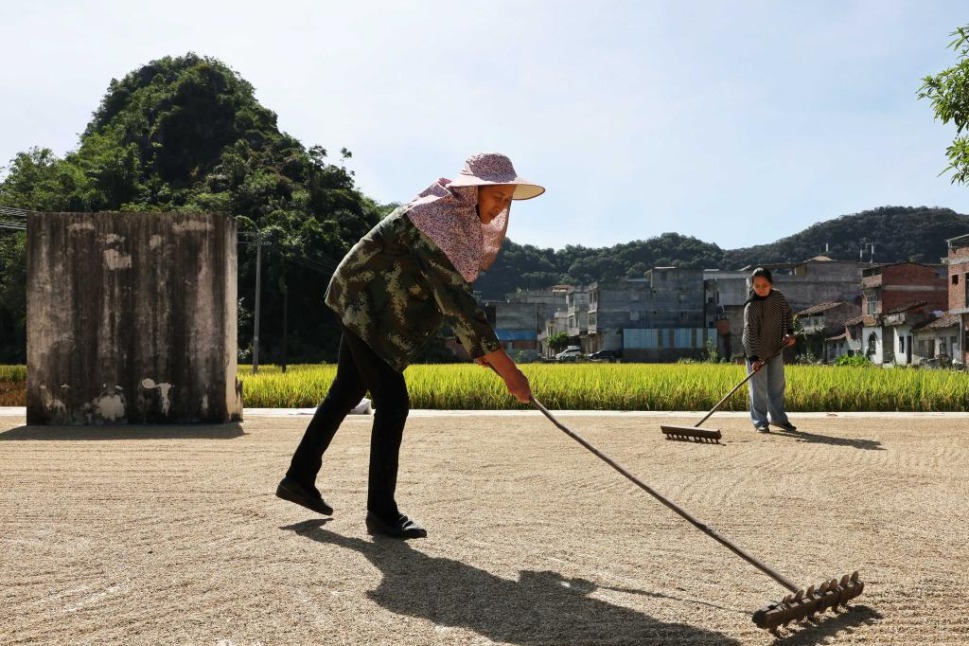Key role seen for Guangdong


Visit: Rural revitalization highlighted by president
President Xi Jinping has called on Guangdong province to lead the nation in comprehensively deepening reform, expanding high-level opening-up, bolstering self-reliance in science and technology and building a modern industry system.
The province should stand at the forefront of the nation in enabling the better coordinated development of urban and rural areas and in promoting the Chinese path to modernization, he said during an inspection trip from Monday to Thursday.
In his fourth trip to the province since becoming general secretary of the Communist Party of China Central Committee in November 2012, Xi traveled to Zhanjiang, Maoming and Guangzhou, the provincial capital, and visited businesses, a port and rural areas.
He went to LG Display's manufacturing base in Guangzhou and GAC Aion New Energy Automobile Co on Wednesday, inspecting production lines and a display of products, and speaking with business executives and workers.
Xi underscored that the strength of the Chinese market will be even more prominent as China accelerates its steps to foster a new development pattern and improve its business climate while global economic growth remains sluggish.
He expressed his hope that foreign investors can seize the opportunity and build up their presence in China, in Guangdong and the Guangdong-Hong Kong-Macao Greater Bay Area, further exploring the Chinese market and making new breakthroughs in their development.
China will remain committed to reform and opening-up in the long run, and the nation will never close the door to opening-up, said the president.
He added that China is willing to work with all countries that are open to win-win cooperation in order to jointly promote the common prosperity and development of the global economy.
Xi reiterated the need for China as a major country to give emphasis to the real economy and ensure its self-reliance, saying that the nation must ensure its self-reliance in core technologies and stay open to international cooperation.
It is important to step up the education and training of talent to harness the foundation for science and technology self-reliance, he said.
While hearing a report by Guangdong authorities on Thursday morning, Xi noted that the Guangdong-Hong Kong-Macao Greater Bay Area plays a key strategic role in the nation's new pattern of development.
Guangdong, the nation's largest economic powerhouse, should use the development of the Greater Bay Area as a major opportunity to further its reform and opening-up and enable the area to serve as the demonstration zone for high-quality development and the leading area for the Chinese path to modernization, said the president.
Xi underlined a high level of self-reliance in science and technology as the key aspect of the Chinese path to modernization, calling for the in-depth implementation of the innovation-driven development strategy, further development of regional innovation systems and improved capacities in independent innovation.
It is important to bolster support for the innovation of smaller businesses and cultivate more innovation-led businesses with independent intellectual property rights and core competitiveness, he said.
He stressed that the nation must prevent any weakening of its real economy in the process of its modernization, saying that China must quicken steps to build a modern industry system underpinned by its real economy.
Guangdong, one of China's largest manufacturing hubs, should give greater emphasis to the growth of its manufacturing sector and the real economy, accelerate the upgrading and transformation of its industries, upgrade its industrial foundations and modernize its industry chains, Xi said.
The president called on the province to step up efforts to solve the problem of unbalanced regional development, push forward the connectivity of infrastructure between regions and enable the eastern, western and northern parts of the province to better undertake the transfer of industries from the more developed Pearl River Delta.
According to local statistics, the nine cities in the delta region account for over 80 percent of Guangdong's total economic volume.
During the trip, Xi also inspected a national reserve of mangroves in Zhanjiang, the largest area of mangroves in China.
He stressed that the area is a national treasure and must be protected accordingly.
It is imperative to persist in green development and work from generation to generation to build a green China and enable the nation to make its due contribution to protecting the Earth, he said.
Xi visited Xuwen Port in Zhan-jiang, a key project facilitating collaboration between Guangdong and the neighboring island province of Hainan, on Monday afternoon.
He stressed the role of the Qiongzhou Strait between Guangdong and Hainan as a vital gateway to the development of the Hainan Free Trade Port.
He said Xuwen Port should be upgraded into a modern, comprehensive hub of water and land transportation that connects the Greater Bay Area and the Hainan Free Trade Port.
In Xuwen county, he visited a reservoir that is part of a water diversion project in the province, where he underscored the need to take issues related to water resources into consideration when pushing forward modernization, as the country faces the challenges of insufficient and unbalanced water resources.
The president went to a village known for growing lychees, a subtropical fruit much loved by the Chinese, in Maoming on Tuesday, where he visited a plantation, spoke with agricultural technicians and learned about the operation of a rural cooperative and its function in promoting rural revitalization.
Xi called for enhancing technologies used in lychee cultivation, preservation and processing to boost the sector and culture-themed tourism.
He told the villagers that to advance Chinese modernization, it is imperative to comprehensively advance rural revitalization and effectively address the imbalance between urban and rural areas and between regions.
Xi added that by following the path of common prosperity, more resources should be allocated to assist less-developed areas, enhance the living environment, and protect the rural environment to improve the quality of life for the people.
- China passes new cruise ship milestone
- China Eastern Airlines unveils Asian Winter Games Aircraft
- Guilin Festival to commemorate Southwest Drama Exhibition's 80th anniversary
- Man arrested in Beijing after stabbing 5 victims
- Policies to support birthrate implemented
- RoboCup sets robots against each other in Qingdao





































